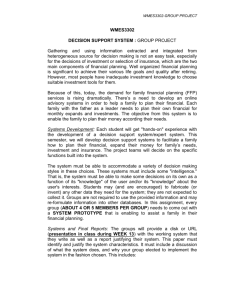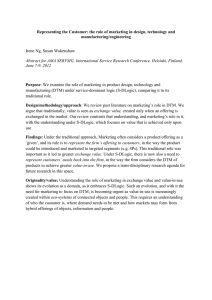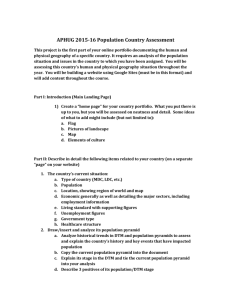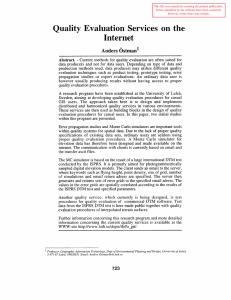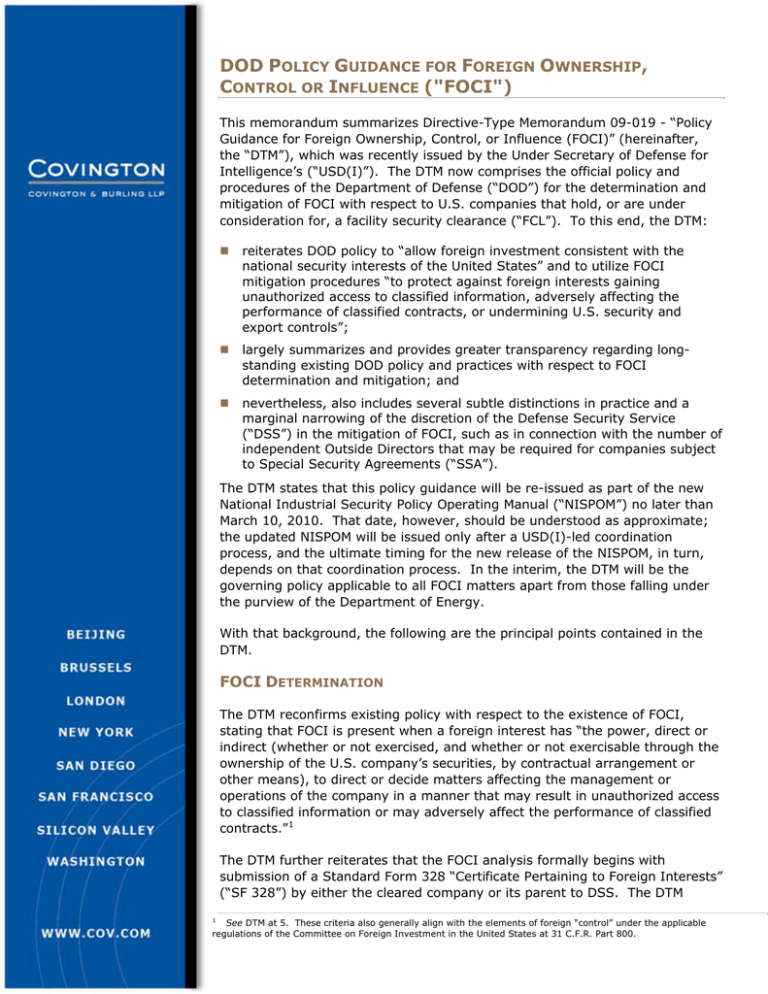
DOD POLICY GUIDANCE FOR FOREIGN OWNERSHIP,
CONTROL OR INFLUENCE ("FOCI")
This memorandum summarizes Directive-Type Memorandum 09-019 - “Policy
Guidance for Foreign Ownership, Control, or Influence (FOCI)” (hereinafter,
the “DTM”), which was recently issued by the Under Secretary of Defense for
Intelligence’s (“USD(I)”). The DTM now comprises the official policy and
procedures of the Department of Defense (“DOD”) for the determination and
mitigation of FOCI with respect to U.S. companies that hold, or are under
consideration for, a facility security clearance (“FCL”). To this end, the DTM:
reiterates DOD policy to “allow foreign investment consistent with the
national security interests of the United States” and to utilize FOCI
mitigation procedures “to protect against foreign interests gaining
unauthorized access to classified information, adversely affecting the
performance of classified contracts, or undermining U.S. security and
export controls”;
largely summarizes and provides greater transparency regarding longstanding existing DOD policy and practices with respect to FOCI
determination and mitigation; and
nevertheless, also includes several subtle distinctions in practice and a
marginal narrowing of the discretion of the Defense Security Service
(“DSS”) in the mitigation of FOCI, such as in connection with the number of
independent Outside Directors that may be required for companies subject
to Special Security Agreements (“SSA”).
The DTM states that this policy guidance will be re-issued as part of the new
National Industrial Security Policy Operating Manual (“NISPOM”) no later than
March 10, 2010. That date, however, should be understood as approximate;
the updated NISPOM will be issued only after a USD(I)-led coordination
process, and the ultimate timing for the new release of the NISPOM, in turn,
depends on that coordination process. In the interim, the DTM will be the
governing policy applicable to all FOCI matters apart from those falling under
the purview of the Department of Energy.
With that background, the following are the principal points contained in the
DTM.
FOCI DETERMINATION
The DTM reconfirms existing policy with respect to the existence of FOCI,
stating that FOCI is present when a foreign interest has “the power, direct or
indirect (whether or not exercised, and whether or not exercisable through the
ownership of the U.S. company’s securities, by contractual arrangement or
other means), to direct or decide matters affecting the management or
operations of the company in a manner that may result in unauthorized access
to classified information or may adversely affect the performance of classified
contracts.” 1
The DTM further reiterates that the FOCI analysis formally begins with
submission of a Standard Form 328 “Certificate Pertaining to Foreign Interests”
(“SF 328”) by either the cleared company or its parent to DSS. The DTM
1
See DTM at 5. These criteria also generally align with the elements of foreign “control” under the applicable
regulations of the Committee on Foreign Investment in the United States at 31 C.F.R. Part 800.
clarifies, however, that DSS may request that one or more of the entities in a corporate
family submit individual SF 328s. Although DSS occasionally has requested individual SF
328s, until now DOD guidance provided solely for a single, consolidated SF 328. Also,
while not stated in the DTM, DSS will accept informal or draft notices of a foreign interest
from either party to a transaction (i.e., a foreign party may itself advise DSS of the
pendency of a transaction), enabling DSS then to solicit submission of the formal SF 328.
The DTM provides that a company may appeal a FOCI determination in writing to the
Director of DSS within 30 days after receipt of DSS’s written decision. DSS, in turn, may
request additional information from the company and must respond within 30 days with a
decision or an estimate as to when a decision will be rendered.
One subtle but notable distinction in the policy expressed in the DTM is that, when new
transactions arise presenting FOCI, DOD no longer will uphold the validity of a FCL simply
on the basis that an acceptable FOCI mitigation instrument is being negotiated. Rather, as
a matter of policy, DSS will continue to maintain the validity of a FCL only in those
circumstances where an acceptable FOCI action plan has been presented and agreed upon.
While this will not result in a significant practical difference for most transactions that
involve foreign control — an acceptable FOCI action plan typically must be in place in any
event for DOD to provide its consent in the parallel review process administered by the
Committee on Foreign Investment in the United States (“CFIUS”) — the new language
does narrow somewhat DSS’s discretion to maintain the validity of a FCL if an acceptable
FOCI mitigation plan has not been agreed upon. This new language, in turn, places an
even greater emphasis on early engagement with DSS to avoid the risk of invalidation to
the FCL or, in cases that involve CFIUS approval, any undue delay in that process. 2
FOCI MITIGATION
The DTM largely summarizes existing practice with respect to acceptable mitigation of
FOCI.
As a starting point, the factors DSS considers when determining the existence and extent
of FOCI largely remain the same in the DTM (e.g., record of economic and government
espionage against U.S. targets, record of compliance with pertinent U.S. laws, regulations
and contracts, the type and sensitivity of the information at issue, and the presence of
foreign government ownership or control). The DTM also adds a “catch-all” statement that
DSS will consider “any other factor” indicating that a foreign interest has the ability to
control or influence the operations or management of the U.S. company. The DTM clarifies
that DSS will consider these factors with regard (i) to the foreign interest that is the
source of the FOCI as well as (ii) any country or countries in which the foreign interest is
domiciled, has its principal place of business, is identified by DSS as a substantial source
of revenue for the foreign interest, or otherwise has significant ties to the foreign interest.
In addition, the DTM makes explicit that DSS will consider counterintelligence and
technology transfer risk assessments for the U.S. company and all entities in the
ownership chain.
If an entity is subject to FOCI, the following mitigation instruments may apply:
2
Board Resolutions, which may apply when a foreign interest does not own voting
interests sufficient to elect or is not entitled to representation on the company’s board.
The requirement to have an acceptable FOCI action plan in place, however, still does not mean that the FOCI mitigation
instrument must be executed and implemented prior to the consummation of a transaction; parties still may consummate
transactions prior to the execution of the agreed-upon mitigation instrument, provided that there is no risk to the classified
information.
2
Security Control Agreements (“SCA”), which may apply when a foreign interest does
not effectively own or control a company or corporate family but is entitled to
representation on the company’s board.
SSAs, which may apply when a foreign interest effectively owns or controls a company
or corporate family.
In lieu of a SSA, passive mitigation instruments — namely, a Voting Trust or Proxy
Agreement — may also apply when a foreign interest effectively owns or controls a
company or corporate family, depending on DSS’s consideration of the FOCI factors
listed above. For example, these corporate structures can effectively negate FOCI both
for foreign government control and for purposes of access to proscribed information
(e.g., Top Secret, communications security, or Restricted Data).
Certain more limited forms of mitigation may be implemented when there is foreign
control or influence without ownership (e.g., specific board resolutions, assignment of
responsibilities to certain board members, diversification or reduction of foreign-source
income, or appointment of a technology control officer).
The DTM also formalizes the process for the precise terms of mitigation instruments. The
USD(I) specifically will approve new templates for the FOCI mitigation agreements. DSS
may then propose changes to the templates in individual cases. However, DSS’s
discretion to depart from the template agreements without prior approval of the USD(I)
extends only to non-substantive provisions in the agreements.
One anticipated change in the new template SSA relates to the number of Outside
Directors. The DTM provides that the number of Outside Directors must exceed the
number of Inside Directors for an SSA, and that “DSS shall determine if the number of
Outside Directors should be a majority of the Board of Directors based on an assessment
of security risk factors pertaining to the company’s access to classified information.” By
comparison, the current template for the SSA provides simply that “the number of Inside
Directors shall not exceed the combined total of Outside Directors and Officer/Directors.”
For example, under the current SSA template, a company subject to a SSA could have four
Inside Directors and four total Outside Directors and Officer/Directors. Under the new
template, the same company would require at least four and, possibly, five Outside
Directors. For companies that already have a SSA, this change will be implemented when
the SSA comes up for renewal.
ADDITIONAL CLARIFICATIONS
There are several other notable confirmations of existing practice and public clarifications
in the DTM, including:
3
The DTM confirms that the statutory prohibition against a foreign government
controlled entity receiving access to proscribed information, in the absence of a waiver,
does not apply if the entity is subject to a Proxy Agreement or Voting Trust.
The DTM confirms that DSS may rule a U.S. company ineligible for a FCL if the identity
of a foreign owner cannot be adequately determined.
The DTM provides additional guidance regarding the content of the Electronic
Communication Plans (“ECP”) that companies are required to adopt under the SCA,
SSA, Voting Trust or Proxy Agreement. ECPs should include detailed network
descriptions and configuration diagrams delineating which networks will be shared and
which will be protected from foreign access, while also addressing firewalls, remote
administration, monitoring, and separate e-mail servers, as applicable.
The DTM confirms that the requirement for a National Interest Determination (“NID”)
to ascertain that access to proscribed information by a company under a SSA will not
harm the national security interests of the United States “applies equally to new
contracts to be issued to companies already cleared under SSAs as well as existing
contracts when cleared companies are acquired by foreign interests and an SSA is the
proposed mitigation.”
If you have any questions concerning the material discussed in this memorandum, please
contact the following members of our international trade group:
Mark Plotkin
David Fagan
Damara Chambers
202.662.5656
202.662.5291
202.662.5279
mplotkin@cov.com
dfagan@cov.com
dchambers@cov.com
This information is not intended as legal advice, which may often turn on specific facts. Readers should seek specific
legal advice before acting with regard to the subjects mentioned herein.
© 2009 Covington & Burling LLP. All rights reserved.
4

